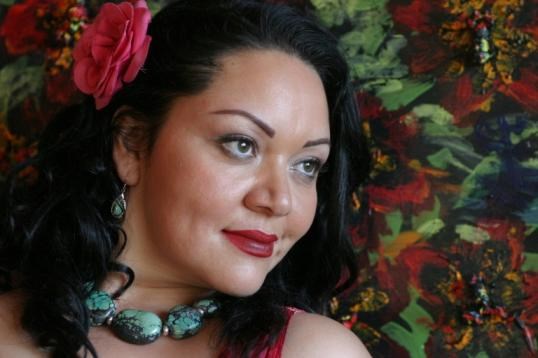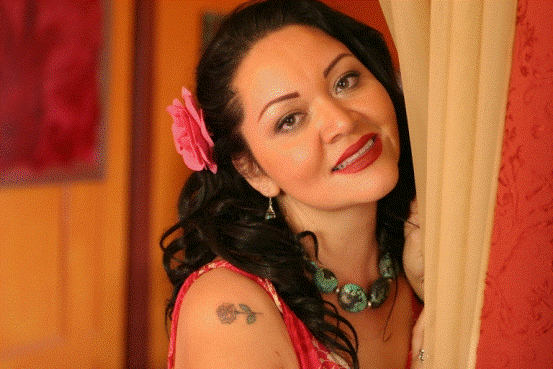 |
| Photo courtesy of Josefina Lopez |
At 5’6, 107 lbs, and about as uncurvaceous as it gets for a Latina, I have to admit I was a little apprehensive at approaching Josefina Lopez. Having seen her highly-acclaimed film (admittedly once I was able to "get over" the title) and being incredibly impressed by her talent and body of work, I consider her a personal hero, albeit despite the potential threat to my own ego. Fortunately, I was impressed and intrigued enough to convince myself to take the plunge anyway. And far more fortunate for me, she agreed to speak to me in return.
Just as they had done so often growing up, insecurities about my body type crept back into my psyche. I wondered, would the screenplay co-author of Real Women Have Curves see me as a "real woman" too? Or would she assume that I too was a victim of the pressures of Western society to be thin? That I was starving myself to retain my leanness? That I was the antithesis of her hard work to promote an image of the natural woman?
I held onto the hope that somewhere into our conversation I could (as I often do) slyly slip in the fact that I merely have a high-revved metabolism, and that my figure comes from no sacrifice of my own. No, perhaps that would make things worse. It was bad enough that I was overly thin – saying it happens effortlessly would seem blasphemous.
I decided it would be best to simply avoid the subject of my waifness, and live with the fact that in being a non-curvy woman, I may very well be considered a detriment to womanhood by a large portion of the female population. I suppose I could make myself live with that.
I figured that our other commonalties would override the physicality. She is a Latina. I am a Latina. Her mother (as was she, herself) was a sewing machine operator in Los Angeles, California. My father, now retired, was a sewing machine operator in Santa Ana, just an hour south of there. She, like I, is a first generation American, the first of her immediate family to graduate from college, and never forgetful of her roots and culture. She writes screenplays. I write magazine articles. And in getting down to the raw basics: She is a woman. I am a woman.
Yet our commonalties end there. For as much as she is a normal woman, with everyday responsibilities, joys, and challenges -- her immense talent, passionate drive, and unsuppressable spirit have made her into an up-and-coming female powerhouse, and one of the most admired Chicanas of her generation.
 |
| Photo courtesy of Josefina Lopez |
Josefina was born on March 19, 1969 in San Luis Potosi, Mexico, and arrived in California at the age of five. Due to complicated immigration laws, she was considered an "illegal alien" and lived undocumented with her family – consisting of eight brothers and sisters - for the next 13 years in Boyle Heights, an area of Los Angeles with a high Latino population. Yet out of tribulation often comes triumph, and in Josefina’s case, it propelled her to delve deeper into her art.
“I truly felt like I was an alien from another planet and was not a human being. I felt invisible. Being undocumented affected me so much; my self esteem. I started writing to affirm my humanity.”
As the years passed, her dreams often felt crushed by additional societal pressures. Early on, she learned the reality of weight-obsessed Hollywood, as blatantly presented to her when a well-intentioned high school teacher told her that in order to have a career as an actress, she needed to lose weight.
“She was my favorite theatre teacher and she told me this coming from good intentions. She had personal life experiences to prove what she was saying. I thank her dearly for being so authentic with me and opening my eyes so that I could do something about it. I truly could choose my future knowing the realities of the business.”
When asked if she felt whether this feminine “ideal” is still as predominant in our society as it was 10 years ago, Josefina passionately assured that it is, and that this message can be detrimental to girls.
“ …objectifying women on film and TV is so profitable the industry will not change. The message is that you are only as valuable as your body or your face. So when you get older you lose your value, [your] currency. It also says what you think is not as important as how you look. You have to be beautiful so you can be loved and be valued. It makes young women have to choose between being beautiful or intelligent.”
Being made to feel as though a second class citizen -- for being a Latina, an undocumented student and worker, and an average-sized woman in rail-thin L.A – brought such an intensity and passion to her writing from so early on, that her first play, written at age 17, Simply Maria or the American Dream won her an Emmy®. At age 19, she wrote her acclaimed Real Women Have Curves, based on her own life experiences. First performed as a play, she later co-wrote a film screenplay of it, and in 2002 it received the Humanitas Award. The film was also honored at the 2002 Sundance Film Festival with 2 awards, including the "Dramatic Audience Award" as a crowd favorite, and went on to play in theatres nationwide.
“I was inspired to write Real Women Have Curves shortly after I got my temporary residence card in 1987. I had been working in my sisters sewing factory just a few weeks before I got it. It was definitely the women and the way they did their work with such dignity that inspired me to write my story. I really enjoyed working there and listening to the gossip of the women. I wanted to celebrate becoming “legal” by writing my play about my experience working in the sewing factory. I wanted to celebrate the camaraderie between women and the power we have when we work together.”
Despite the painful societal realities she was so often presented with, Josefina used her own inner-strength, and all she had learned from other strong women, to forge ahead valiantly. Despite initial financial aid setbacks due to her immigration status, she graduated from Columbia College in 1993 and earned an MFA in screen-writing at UCLA’s prestigious Film and Television School. She feels it is important for Latinos, and all other minorities, to use education as a tool for self, and community empowerment.
“…It definitely starts with education and of course, getting fair representation. I hope we elect a Latino mayor soon so we can see what kind of empowerment for Latinos comes with that. Even if it is just the ability to dream that a Latino can someday be President.”
Likewise, she has also made it her mission to help Latinos find their power through their own voice, and their own story. She encourages oral tradition amongst minorities, and sees a real need in show business for good Latino storytellers – whose stories she feels will help transform perceptions of Latinos, and materialize progress.
“Oral tradition is very important. I learned to become a writer by listening to my mother’s stories and gossip and my grandfather’s ghost stories. I think there are so many Latino authors out there who don’t know they are writers because they are working in beauty shops telling their stories to other women. If these women simply wrote down their stories and edited them and put them in the acceptable mainstream formats then they could be considered authors instead of 'chismosas' ['gossips'].”
Josefina founded Casa 0101, a theatre arts space in Boyle heights whose mission states: "Casa 0101 was founded by Josefina Lopez, a playwright, activist, artist ….to bring live theatre, digital filmmaking, dance and art to Boyle Heights so as to nurture the future storytellers of Los Angeles who will someday transform the world." Highly involved in the effort, she even taught screenwriting and playwriting, herself, at Casa 0101. While she is no longer its artistic director, she trusts that its new director will continue to carry the torch to inspire other artists as she hopes that she, herself, did.
As time passes, naturally Josefina’s artistic mission evolves, propelled by that with which she is inspired.
“When my career began my concern was the accurate and fair representation of Latinos on TV and film as well as women’s rights. What inspires me know is global understanding and the love and care of our planet. I’m becoming a citizen of the world. I still, however, see how important the sacred feminine is to the survival of the planet and humanity.”
Currently, Josefina lives in Paris with her husband and son, and is pregnant with a second boy, due in June of 2005. Though she doesn’t have a daughter, she has given much thought as to what she would teach her if she did. Her words of wisdom are food for thought for other parents, and for girls, themselves.
“I don’t think it’s as important what you say to a girl about her body as much as how you are her best model of self-worth. In raising a young girl you would have to be the kind of woman that she would want to model herself after. Most of the time, young girls resist becoming their mothers because mothers had to pass down a lot of bad advice that continued oppressing women – of course given with the best of intentions. So I would have to love my body, cherish myself, pamper myself and value myself so that naturally my daughter would know what self-esteem and confidence looks like.”
She continued: “ I would remind my daughter that ads with unrealistically perfect looking women are sad imitations of real women. I would encourage my daughter to celebrate her femininity, but not at the price of her whole self which also includes her masculine side which is the assertive, leader, active self. I would show my daughter what it is to be a whole person first before being just a “girl.”
Does this hero have a hero of her own?
“I would say that the little girl inside of me thinks I’m her hero…probably subcommandante Marcos and Michael Moore.”
As I listen to her, I am finally struck with the realization that to Josefina, being a "real woman" has nothing to do with whether one has curves or not, but everything to do with being comfortable inside your own skin, whatever shape or color or consistency it may take on. It’s about finding your own voice, and not allowing the insecurities of your perception of your outer appearance to suppress the power of your inner spirit. It’s about seeking out the beauty that lies within regardless of whether or not your physical appearance is considered beautiful by the society in which you live. Being a real woman, or better yet, a real human -- male or female, at that -- is about recognizing the raw curves of your potential, the deep crevices of your mind, the shape of your true voice, and the silhouette of your soul.
Real women do have curves after all. I just wear mine on the inside.
Page created on 7/28/2014 12:53:13 PM
Last edited 8/9/2018 7:46:37 PM
